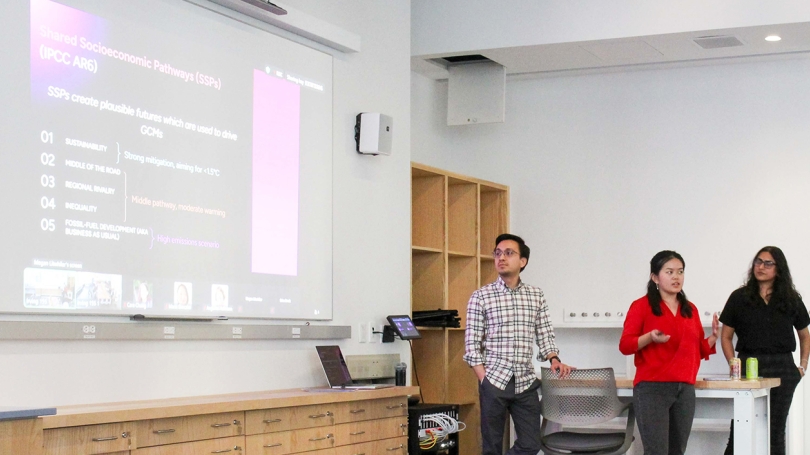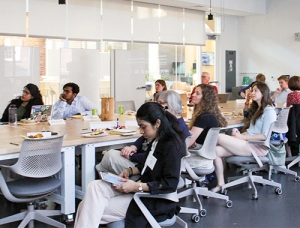

Accelerating an affordable, reliable, and equitable clean energy future requires innovation and collaboration across disciplines. That's why the Irving Institute launched a new Graduate Energy Fellows program for the 2024–2025 academic year. This new initiative brought together a curious cohort of master's and PhD students from diverse fields such as engineering, data science, public health, and Earth sciences—fostering interdisciplinary collaboration and innovation.
The program fostered a multidisciplinary community of emerging energy and climate leaders. Participants gained invaluable opportunities to network with top industry and policy experts, engage in mentorship, participate in high-profile conferences, and undertake independent investigations.
"I was very happy with my experience. I connected with a wonderful mentor who was genuinely interested in my project and my growth, despite coming from vastly different industries. I am able to use my project in my professional career and potentially translate my literature review into a usable and relevant project for myself and my coworkers."
– Irving Institute Graduate Energy Fellow

On May 12, 2025, the inaugural cohort gathered to present their final projects and reflect on their experiences throughout the year. Participants expressed gratitude for the program's adaptability and valued the opportunities it provided for networking, mentorship, and cross-disciplinary exposure. As one Fellow remarked, "It's really what you make of it," capturing the program's flexible and self-driven spirit.
Many Fellows pursued ambitious independent or team-based investigations that pushed them beyond their comfort zones. Although these extracurricular endeavors often left more questions than answers, they laid a vital foundation for ongoing investigation and future scholarship.
Among the Fellows, Master of Public Health (MPH) student Cara Chen explored the "Energy Footprint of Generative AI Answering Patients' Health Questions." Her investigation examined the trade-offs between technological benefits and environmental costs. Her exploration revealed the potential for significant efficiency gains in healthcare, where deploying AI to field patient questions could save more than 8,000 clinician hours annually. However, Chen remained cautious about potential environmental impacts, emphasizing the importance of balancing innovation with sustainability.

In a collaborative effort, PhD candidates Mansa Krishna (Earth Science), Fernando Montano Lopez (Ecology, Evolution, Environment, and Society), and Jannitta Yao (Earth Science) pursued an effort titled "Assessing Climate Pathways of the Energy Transition." They leveraged their experience with complex models to forecast greenhouse gas emissions during the shift to low-carbon energy sources. They entered a wide range of inputs and outputs to understand how the decarbonization process might influence planetary systems. Their analysis projected an uptick in the production of greenhouse gas emissions consequent of the development of low-carbon energy technologies. In the future, the team would like to see emissions associated with the energy transition pathways integrated into climate models.
Further expanding the program's scope, a team of Geisel and Thayer students—David Tuck (MPH), Matthew Ritterbusch (Master of Engineering), and Jackson McLain (Master of Engineering Management)—created a framework to evaluate the full costs of various energy sources. By including health and end-of-life expenses alongside traditional financial measures, they aim to inform policy and advance discourse on energy economics.
Working independently, MPH student and nurse anesthesiologist Marie Skoczlas investigated how to reduce the environmental impact of anesthesia gases. She highlighted the substantial global warming potential of agents like desflurane and advocated for simple adjustments—such as changing machine settings—to minimize waste and environmental harm.
Finally, MEM students Siva Thota and Deepika Karanji developed ECO LENS, a tool designed to measure a product's full life cycle carbon emissions. By integrating AI systems, the tool aims to address existing barriers in environment, social, and governance (ESG) reporting, offering a more comprehensive view of corporate carbon footprints.
"We were delighted to see the Graduate Energy Fellows program catalyze the energy, talents, and diverse perspectives of Dartmouth's amazing master's and PhD students to examine and even develop ideas for tackling critical energy and climate challenges," said Academic Director Amanda Graham. "We hope these explorations across fields and the connections they built with each other will help sustain their enthusiasm for multidisciplinary scholarship and practical impact to advance more sustainable energy futures."